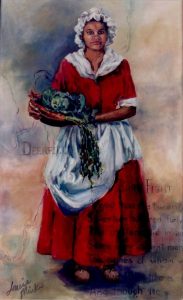 PVMA is committed to help voice the unheard and little known lives of New England’s African Americans and Afro-Indians, free and enslaved, through our on-going African Americans in Rural New England project, now approaching its 30th year.
PVMA is committed to help voice the unheard and little known lives of New England’s African Americans and Afro-Indians, free and enslaved, through our on-going African Americans in Rural New England project, now approaching its 30th year.
Americans learn very little about the many significant roles played by African Americans in what is often called the birthplace of American freedom—colonial and revolutionary Massachusetts. Yet the trade in African captives undergirded New England’s maritime commercial development, and African Americans in slavery and freedom made essential contributions to New England life as artisans, laborers, poets, writers, soldiers, and ministers. Knowing this history is key to building cross-racial and cross-cultural understanding today.
- In 1994, PVMA hosted a full year artist-in-residence program that produced portraits depicting historical and contemporary African Americans in our region including the painting above of Lucy Terry Prince. The portraits continue to tour area schools and libraries and the project marked the start of PVMA’s commitment to ongoing African American programming.
- In 1997, PVMA published Lucy Terry Prince: Singer of History, a brief biography by PVMA Librarian, David Proper.
 In 1998, African American history was one of four featured exhibits in our American Centuries website for teacher use.
In 1998, African American history was one of four featured exhibits in our American Centuries website for teacher use.- From 2001 to 2006 – Extensive research was conducted by graduate student interns and a library volunteer in the PVMA Memorial Libraries’ archives of 18th century primary sources such as: account and day books; military records; Town of Deerfield documents; vital, legal, and church records; personal letters; diaries; ledgers; etc. Over 2,000 entries were found regarding free and enslaved African Americans and Indigenous peoples living in Deerfield. They were then transcribed into a spreadsheet which was converted to an online database in 2013.
- In 2005, African American programs expanded with the launching of an official PVMA African Americans in New England Project when PVMA convened an African American Monument Committee comprised of African American citizens and area organizations. PVMA, working with the committee and using PVMA’s library collections
- documented 23 African American related sites in the Old Deerfield Village Historic Landmark District
- created a first version of an interpretive map of these African American sites available on PVMA’s American Centuries website
- oversaw the creation of a memorial plaque commemorating enslaved Africans of Deerfield. Designed
 by African American artist and educator Shemek Weddle and crafted by Dimitrios Klitsas, PVMA installed the plaque in Memorial Hall Museum’s Memorial Room in 2005. For Weddle, the plaque is “a call to and from the past to the future and the present.”
by African American artist and educator Shemek Weddle and crafted by Dimitrios Klitsas, PVMA installed the plaque in Memorial Hall Museum’s Memorial Room in 2005. For Weddle, the plaque is “a call to and from the past to the future and the present.”
- In 2012-13, PVMA conducted a National Endowment for the Arts (NEA) Big Read of Zora Neale Hurston’s novel, Their Eyes Were Watching God. Programming included book discussions throughout the valley; a presentation by Zora Neale Hurston’s niece, Lucy Anne Hurston; an evening culinary and music event; and an off-site student art and history exhibit exploring quilting traditions from North and South, “Make What You Can of It.”

- From 2012-2015, PVMA hosted a number of living history events to bring New England’s African American history to the public. In 2012, the Stone Soul Peter Brace Brigade joined Tory reenactors for a Patriot’s Day event exploring the complicated stories of the American Revolution. That summer, and again in 2015, the Mass 54th Colored Troops joined Stone Soul for a July 4th reenactment. Stone Soul members worked with PVMA to create a series of tool videos for the American Centuries website.

- In 2013, a National Endowment for the Humanities (NEH) Museums and Cultural Organizations Planning Grant supported
 realization of goals set by the African American project committee. This NEH project put the pieces in place for expansion of African American programming throughout PVMA, resulting in ongoing programs including
realization of goals set by the African American project committee. This NEH project put the pieces in place for expansion of African American programming throughout PVMA, resulting in ongoing programs including- nearly 50 African American history lessons on our American Centuries website
 an interactive on-line map of historic sites available on American Centuries and a printed map that guides a walking tour available throughout the historic village
an interactive on-line map of historic sites available on American Centuries and a printed map that guides a walking tour available throughout the historic village- public concerts and public programs with an African American focus (e.g. Juneteenth Celebrations)
- new in-class and field trip programs on African American history
- “Digging for Truth,” a joint lecture series co-hosted with Historic Deerfield, Inc. focused on archaeology at African American sites. In June 2013, an archaeology team led by Nick Bellantoni conducted a GPR (Ground Penetrating Radar) survey at the Old Albany Road Burying Ground in Deerfield seeking evidence of unmarked graves of African American and other marginalized residents.

- an African Americans in Early New England portal on American Centuries,
 bringing together and highlighting PVMA’s primary sources, educational materials, videos, exhibits, and activities that illuminate this history
bringing together and highlighting PVMA’s primary sources, educational materials, videos, exhibits, and activities that illuminate this history - an African Americans in Rural New England database, which includes 2,400 records documenting 100 Africans (enslaved, became freed, and always free) who lived in Deerfield in the 18th century.
- sharing 20th-century African American oral histories on the American Centuries website, including World War II veteran Ray Elliott and Civil Rights activist Juanita Nelson.

- 2013-2023: A 2013 NEH planning grant included developing a preliminary vision for a website addressing the lack of awareness of slavery in rural New England, with Lucy Terry Prince (c. 1730-1821) as a central figure. An NEH Discovery Grant in 2021 enabled PVMA to develop this groundbreaking website concept; NEH awarded PVMA additional funding in 2022 to produce a working prototype. PVMA’s project team is currently hard at work creating Lucy Terry Prince: A Window into African American Life in Early Rural New England, illustrated by African American multimedia artist and muralist David Cooper.
- 2016-2020 Juneteenth Programming: In 2016, a series of musician workshops and rehearsals culminated in “A Legacy of African-American Music,
 People, and Place: 1700 -1920s” June 19th performance at Old Deerfield’s Brick Church. In 2018, Metropolitan Opera tenor Irwin Reese and local pianist Julia Bady presented a Juneteenth concert of songs in a broad variety of styles.
People, and Place: 1700 -1920s” June 19th performance at Old Deerfield’s Brick Church. In 2018, Metropolitan Opera tenor Irwin Reese and local pianist Julia Bady presented a Juneteenth concert of songs in a broad variety of styles.  In 2020, PVMA published a Juneteenth newspaper exhibit celebrating African American contributions to our nation’s history. Learn more here.
In 2020, PVMA published a Juneteenth newspaper exhibit celebrating African American contributions to our nation’s history. Learn more here.- Since 2013, PVMA has led NEH Landmarks of American History and Culture Workshops for teachers, which continue to develop our African American scholarship and resources as well as expand our audiences.
 New exhibit in 2021 at Memorial Hall Museum: A Tale of Two Fiddles: By contrasting an historical depiction of Black performers to the lived experience of one contemporary Black musician and entrepreneur, we can see how perception and reality diverged from one another and left lasting impacts on the ways we view issues of race today.
New exhibit in 2021 at Memorial Hall Museum: A Tale of Two Fiddles: By contrasting an historical depiction of Black performers to the lived experience of one contemporary Black musician and entrepreneur, we can see how perception and reality diverged from one another and left lasting impacts on the ways we view issues of race today.- July 11, 2021 – Lucy Terry Prince Day: a FREE Day in Old Deerfield with America’s First African American Poet. July 11th is “Lucy Terry Prince Day,” marking the bicentennial of the first known African American poet’s death. Detailed Event Schedule here.
 .
.  Juneteenth Concert, June 19, 2022: A concert of song in celebration of Juneteenth! Juneteenth is the oldest nationally celebrated commemoration of the ending of slavery in the United States. Featuring: Tenor Irwin Reese and Julia Bady, pianist. Julia Bady and Irwin Reese have enjoyed collaborating since 2010 and have performed throughout the New York/New England region.
Juneteenth Concert, June 19, 2022: A concert of song in celebration of Juneteenth! Juneteenth is the oldest nationally celebrated commemoration of the ending of slavery in the United States. Featuring: Tenor Irwin Reese and Julia Bady, pianist. Julia Bady and Irwin Reese have enjoyed collaborating since 2010 and have performed throughout the New York/New England region.- April 2023: World Premiere of “Night at the Museum,” followed by panel discussion:
 PVMA and Shelburne Falls’ Piti Theater Company premiered “Night at the Deerfield Museum,” blending documentary and narrative filmmaking to share African American History in Franklin County. The documentary looks at the mid-1800’s in Greenfield when Dexter Marsh, who was among the earliest discoverers of fossilized
PVMA and Shelburne Falls’ Piti Theater Company premiered “Night at the Deerfield Museum,” blending documentary and narrative filmmaking to share African American History in Franklin County. The documentary looks at the mid-1800’s in Greenfield when Dexter Marsh, who was among the earliest discoverers of fossilized  dinosaur tracks, lived near John Putnam, an African American entrepreneur and bandleader today considered the “father of contradance.”
dinosaur tracks, lived near John Putnam, an African American entrepreneur and bandleader today considered the “father of contradance.”- Djeli, Co-Director, Co-Writer and Actor
- Amina Jordan-Mendez, Actor
- Barbara Mathews, PhD., Independent Historical Consultant
- Timothy Neumann, Executive Director, PVMA
- Jonathan Mirin, Co-Director, Co-Writer and actor, Piti Theatre Co.
 December 2023: PVMA presents a preview screening of Piti Theatre Company’s documentary and “streaming theater” project ‘The Princes of Deerfield.” The film is focused on the lives of Abijah and Lucy Terry Prince, created in collaboration with Djeli, our partner in last year’s “Night at the Deerfield Museum,” supported by a grant from the Mass Humanities’ Expand Massachusetts Stories initiative. View the film here.
December 2023: PVMA presents a preview screening of Piti Theatre Company’s documentary and “streaming theater” project ‘The Princes of Deerfield.” The film is focused on the lives of Abijah and Lucy Terry Prince, created in collaboration with Djeli, our partner in last year’s “Night at the Deerfield Museum,” supported by a grant from the Mass Humanities’ Expand Massachusetts Stories initiative. View the film here.- May 2024: PVMA and Piti Theatre presents The Princes of Deerfield: a Zoom World Premiere. What might life have been like for a free African American couple in Deerfield in the late 1700’s? The Princes of Deerfield blends documentary with a narrative that imagines a group of children who gather in a fictional former barn of Lucy Terry and Abijah Prince. Lucy Terry Prince is America’s first documented African American poet.
 Following the 45 minute film, there is a panel discussion featuring Traci Parker, PhD, Associate Professor of African American History; Djeli, Co-Director, Co-Writer and Actor; Amina Jordan-Mendez, Actor; Barbara Mathews, PhD., Independent Historical Consultant; Timothy Neumann, Executive Director, PVMA; Jonathan Mirin, Co-Director, Co-Writer and actor, Piti Theatre Co.
Following the 45 minute film, there is a panel discussion featuring Traci Parker, PhD, Associate Professor of African American History; Djeli, Co-Director, Co-Writer and Actor; Amina Jordan-Mendez, Actor; Barbara Mathews, PhD., Independent Historical Consultant; Timothy Neumann, Executive Director, PVMA; Jonathan Mirin, Co-Director, Co-Writer and actor, Piti Theatre Co.
The film and discussion are now available at www.ptco.org/yourtown.

 In 1998, African American history was one of
In 1998, African American history was one of 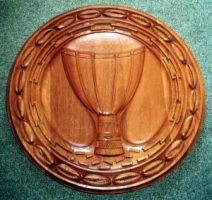 by African American artist and educator Shemek Weddle and crafted by Dimitrios Klitsas, PVMA installed the plaque in Memorial Hall Museum’s Memorial Room in 2005. For Weddle, the plaque is “a call to and from the past to the future and the present.”
by African American artist and educator Shemek Weddle and crafted by Dimitrios Klitsas, PVMA installed the plaque in Memorial Hall Museum’s Memorial Room in 2005. For Weddle, the plaque is “a call to and from the past to the future and the present.”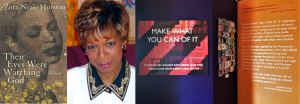

 realization of goals set by the African American project committee. This NEH project put the pieces in place for expansion of African American programming throughout PVMA, resulting in ongoing programs including
realization of goals set by the African American project committee. This NEH project put the pieces in place for expansion of African American programming throughout PVMA, resulting in ongoing programs including an interactive on-line map of historic sites available on American Centuries and a printed map that guides a walking tour available throughout the historic village
an interactive on-line map of historic sites available on American Centuries and a printed map that guides a walking tour available throughout the historic village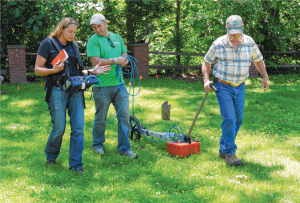
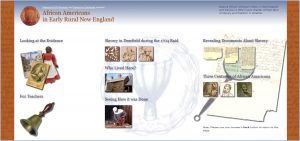

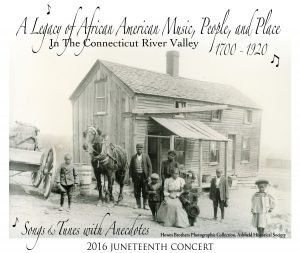 People, and Place: 1700 -1920s” June 19th performance at Old Deerfield’s Brick Church. In 2018, Metropolitan Opera tenor Irwin Reese and local pianist Julia Bady presented a Juneteenth concert of songs in a broad variety of styles.
People, and Place: 1700 -1920s” June 19th performance at Old Deerfield’s Brick Church. In 2018, Metropolitan Opera tenor Irwin Reese and local pianist Julia Bady presented a Juneteenth concert of songs in a broad variety of styles.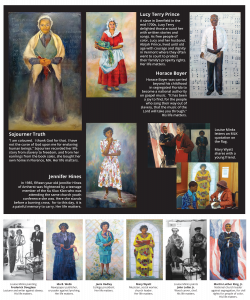
 New exhibit in 2021 at Memorial Hall Museum: A Tale of Two Fiddles: By contrasting an historical depiction of Black performers to the lived experience of one contemporary Black musician and entrepreneur, we can see how perception and reality diverged from one another and left lasting impacts on the ways we view issues of race today.
New exhibit in 2021 at Memorial Hall Museum: A Tale of Two Fiddles: By contrasting an historical depiction of Black performers to the lived experience of one contemporary Black musician and entrepreneur, we can see how perception and reality diverged from one another and left lasting impacts on the ways we view issues of race today.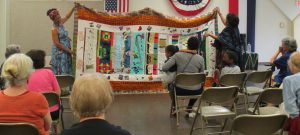
 Juneteenth Concert, June 19, 2022: A concert of song in celebration of Juneteenth! Juneteenth is the oldest nationally celebrated commemoration of the ending of slavery in the United States. Featuring: Tenor Irwin Reese and Julia Bady, pianist. Julia Bady and Irwin Reese have enjoyed collaborating since 2010 and have performed throughout the New York/New England region.
Juneteenth Concert, June 19, 2022: A concert of song in celebration of Juneteenth! Juneteenth is the oldest nationally celebrated commemoration of the ending of slavery in the United States. Featuring: Tenor Irwin Reese and Julia Bady, pianist. Julia Bady and Irwin Reese have enjoyed collaborating since 2010 and have performed throughout the New York/New England region.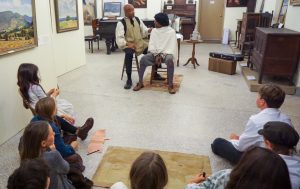 PVMA and Shelburne Falls’ Piti Theater Company premiered “Night at the Deerfield Museum,” blending documentary and narrative filmmaking to share African American History in Franklin County. The documentary looks at the mid-1800’s in Greenfield when Dexter Marsh, who was among the earliest discoverers of fossilized
PVMA and Shelburne Falls’ Piti Theater Company premiered “Night at the Deerfield Museum,” blending documentary and narrative filmmaking to share African American History in Franklin County. The documentary looks at the mid-1800’s in Greenfield when Dexter Marsh, who was among the earliest discoverers of fossilized 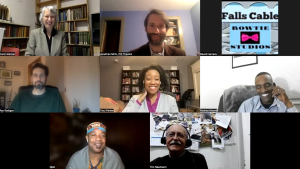 dinosaur tracks, lived near John Putnam, an African American entrepreneur and bandleader today considered the “father of contradance.”
dinosaur tracks, lived near John Putnam, an African American entrepreneur and bandleader today considered the “father of contradance.” December 2023: PVMA presents a preview screening of Piti Theatre Company’s documentary and “streaming theater” project ‘The Princes of Deerfield.” The film is focused on the lives of Abijah and Lucy Terry Prince, created in collaboration with Djeli, our partner in last year’s “Night at the Deerfield Museum,” supported by a grant from the Mass Humanities’ Expand Massachusetts Stories initiative. View the film
December 2023: PVMA presents a preview screening of Piti Theatre Company’s documentary and “streaming theater” project ‘The Princes of Deerfield.” The film is focused on the lives of Abijah and Lucy Terry Prince, created in collaboration with Djeli, our partner in last year’s “Night at the Deerfield Museum,” supported by a grant from the Mass Humanities’ Expand Massachusetts Stories initiative. View the film 